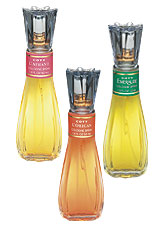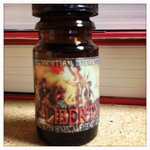Perfume Advice From The Noses: Yay for Drugstore Fragrances & Nay for Body Chemistry {Fragrant Reading} {Scented Thoughts}

Three young perfumers from Drom, Pierre Constantin-Guéros, Valérie Garnuch-Mentzel, and Dephine Jelk offer liberal advice on dos and donts to perfume afcionados and attempt to debunk a few myths in passing. Guéros for example advises to overlook the shape of the perfume bottle and says, “You’d be surprised to know that a lot of drugstore perfume companies spend more on the juice,”. He does not believe in the alleged all-transforming power of each individual's body chemistry either,
“Unless you eat very spicy food all the time, your body chemistry won’t change a fragrance,” explains Guéros. “That’s a bit of a myth—you’d have to have a trained nose to be able to distinguish how a scent smells differently on two people.”........
Coffee beans to clear the nose is an interesting element of folklore too. And there is more.
Some of what they say is easier to critique than the thorny issue of body chemistry, which some people believe strongly in, but that we personally, have never experienced in a way that completely distorted a fragrance and made it unrecognizable. One would have to take into account questions of cognition and consciousness too when evaluating this issue. Other factors can influence the differentiated perception of a perfume that would have to do more with states of consciousness and expectations. For example, anyone can relate to the experience of picking up different facets of a scent depending on the moment in time and focus.
Regarding what they say about citrus being more volatile than other materials and disappearing more quickly - this is conventional wisdom and it may still hold true for the isolated material, but in reality citrus-based fragrances now manage to be very long lasting. For example, the Fleur d'Oranger 2007 I dabbed on my clothing is still here the next morning and the citrus notes are especially persistent.
SAs can be well-trained but most of the time your run-of-the-mill perfume SA is not very well versed in fragrances.
Pulse points we also find are overrated. And we already attempted to address the myth of the "crushing of the perfume molecules" with chemist Ryan Spoering by substituting a possible explanation based on friction and heat.
And yes, there are some very good drugstore perfumes. Take Canoe by Dana or Old Spice. I have been wearing L'Origan by Coty in a cheap kitschy bottle and it smells like a terrific fruitier and more amber-y version of L'Heure Bleue by Guerlain (in fact L'Origan influenced L'Heure Bleue).
Read more in Time Out New York......
(Image from coolantarctica)










For those who laugh at the idea of body chemistry changing a fragrance, I'll invite them over to smell White Linen on me and on anyone else. If you can recognize it on me, even vaguely, you are a genius. I've never smelled such tragic floral trainwreck as White Linen on me, although it smells fine on others. And anything with "clean musk" or "white musk" will smell like an unwashed armpit rubbed with cumin and tar on me. If it's not body chemistry, it must be all that chocolate I eat!
SniffQ,
Thank you for your testimonial. The reason why I am a bit skeptical about the body-chemistry theory is that I personally have never smelled such huge discrepancies on people or on one person overtime (hormones, diet,..). I don't know if what people mean by body chemistry is due to other factors. A perfume could be a bit more powdery etc because the person had a dry skin etc but not to the point of smelling like a "dead animal" for example. If a person smelled particularly good it might be due to a good hydratation as this is important, layering with lotion etc...
First by Van Cleef & Arpels or Chanel No 19 for example I have smelled on a number of persons, including me, and in different countries and it always smells the same, very recognizable...
There is also that theory out there that blondes, redheads, and brunettes have typical skins and should wear corresponding perfumes, so I don't know how this tie in with the individual BC idea.
But, I'd be interested to smell an extreme case:)
I find some of Gueros' comment to be rather patronizing. I am more than capable of discerning when my body chemistry distorts a fragrance at dry-down, whereas the same fragrance will smell lovely on another person. However my nose has been "trained" by a liflong love of perfume.
I'm firmly in the body chemistry camp here - possibly it doesn't make a perfume unrecognizable (it does to me, but I don't really have all that sensitive a nose), but I do have a friend who smells exceptionally good, warm and elegant as cashmere, in Angel, while I smell exceptionally caries-inducing in it, artificially sweet and nothing else. Opium smells great on many people I know, it smells terrible, cheap and of decades-old sweat on me..... So if body chemistry is a myth, what would the explanation for this be?
The thing is that I think we all use the notion of "body chemistry" or "skin chemistry" in a popular way. If there are factors that influence the development of a perfume on a skin + its perception + physical context (room) + diet + soaps used and more, then it might be just a simplified way of talking about a complex phenomenon.
I have no idea. I sometimes use the expression as a shorthand but I always feel uncomfortable using it as I am well aware that I don't really know what I am talking about.
I see the expression linked to perfumes on advice pages, not scientific ones.
At this point I think we could argue endlessly since all these are only opinions not scientifically controlled results.
Opinion maybe, but it's hard to argue with one's nose. I couldn't wear the Oscar de la Renta or (the original) White Shoulders cologne that smelled so lucious on my friends. There may never be a controlled study on this, but the number of people who've had the same experiences with different perfumes strongly suggests that body chemistry does play a strong role. The soap theory appealed to me too, until I tried using the same soaps my friends did, with poor results. Confirmed by my otherwise kind friends.